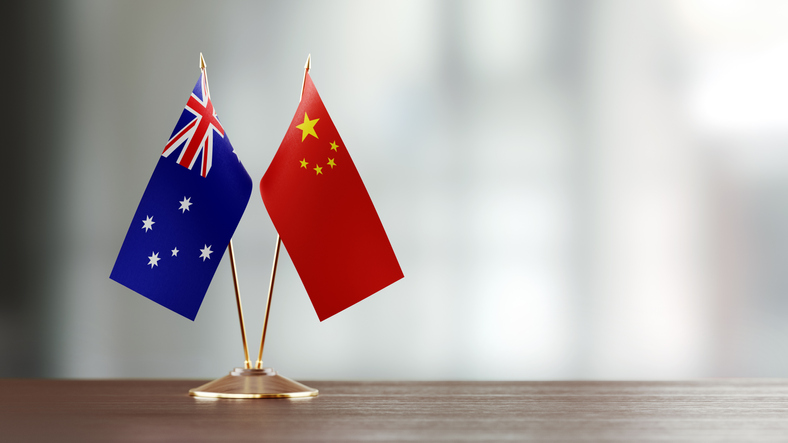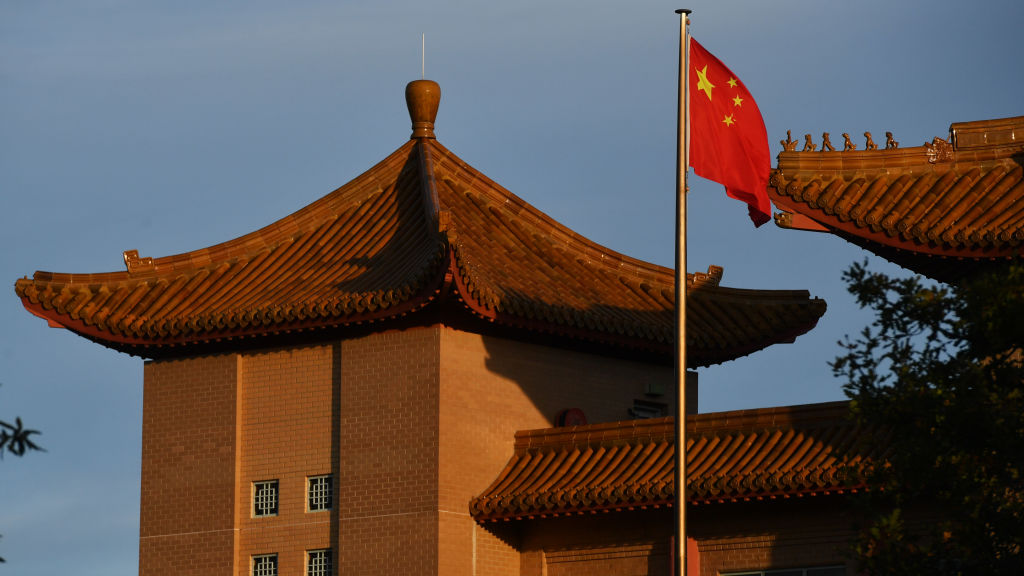
Editor's Note: Ken Moak taught economic theory, public policy and globalization at the university level for 33 years. He co-authored the book "China's Economic Rise and Its Global Impact" in 2015. The article reflects the author's opinions, and not necessarily the views of CGTN.
Australia gave hypocrisy a new meaning by accusing China of meddling in its internal affairs and abusing human rights when it committed those misdeeds far worse than the Asian power ever did. Complaining about the Chinese government "incarcerating" over a million Uygurs while forcing the Aborigine population onto "Godforsaken" lands to endure perpetual poverty and misery is a case in point. The latest was Australian Prime Minister Scott Morrison throwing a tantrum at Chinese diplomat Zhao Lijian posting an Australian soldier was about to cut an Afghan child's throat, calling the picture "repugnant" and "fake." Whether Morrison was right or wrong, of course, depends on whom one talks to, but Australian military authorities did charge 39 soldiers for committing murder in Afghanistan between 2012 and 2013. Zhao was only making a statement of fact.
But that did not stop Australia from criticizing China's "incarceration" of Uygurs largely based on what the U.S. propagated and without proof. And even if it did, the Chinese government at least provided training to provide potential radical Uygurs with skills to improve their livelihood instead of risking their lives by committing terror acts. The Australian government, on the other hand, only talked about improving the livelihood of the Aborigines and the systematic racism they encountered, but did little, if anything, about its first people's plights. On accusing China of interfering in Australia's internal affairs, wasn't that exactly what its government, media and pundits did when they criticized the country for passing the national security law for Hong Kong? Hong Kong Island and a small strip of Kowloon were ceded to Britain in perpetuity in the First and Second Opium War, the other 90 percent were forcibly leased for 99 years. Upon the lease's expiration, Britain returned all of Hong Kong to China, thus there is no denying that the territory is part of China.
On China "bullying" small nations in the South China Sea and not accepting a Permanent Court of Arbitration (PCA) arbitral tribunal's ruling in favor of the Philippines in 2016, Australia again "spoke from both sides of the mouth." A report in Chinese media on September 9, 2016, for example, had disclosed the Australian government argued that The Hague has no jurisdiction on a dispute between it and East Timor.
East Timor sued Australia at The Hague in an attempt to renegotiate their maritime boundaries, suggesting Australia "bullied" East Timor into giving up the area with an abundance of natural gas reserves.
China said that the PCA arbitral tribunal was a "kangaroo" court instigated by the U.S. and Japan whose ruling was a forgone conclusion. The judges were handpicked by a Japanese jurist with close ties to the then Prime Minister Shinzo Abe and the estimated $23 million court cost was said to have been paid by Japan. China therefore refused to participate in the charade.

A Chinese national flag flies at the Embassy of the People's Republic of China, in Canberra, Australia, May 12, 2020. /Getty
A Chinese national flag flies at the Embassy of the People's Republic of China, in Canberra, Australia, May 12, 2020. /Getty
Contrary to the charges of intimidating smaller nations, China urged joint development between it and claimants within the disputed territories, suggesting that it, too, wanted other claimants to benefit from the resources underneath the waters. This is actually a practical policy because domestic politics prevented (and will continue to preclude) any claimant government from making compromises on boundary lines. This rigid position made border disputes difficult to resolve as the China-Japan dispute over the Diaoyu Islands attested.
Furthermore, Australia is not only hypocritical but also paranoiac, in that Chinese-Australians making political donations were considered to be buying influence on behalf of and students spying for the Communist Party of China (CPC). A senator even demanded that Chinese-Australian politicians denounce the CPC to prove their allegiance to the country. Funny Australian politicians did not accuse European-Australians of the same on behalf of foreign governments when making political donations.
In any event, being hypocritical and paranoid over everything China does has damaged Australia's international image. For example, reader comments on the November 29 and 30 South China Morning Post reports show an overwhelming majority accusing Australia of hypocrisy. If that was the consensus, it would harm Australia's international image as the "champion of human rights" or other democratic values.
Accusing China of committing the "sins" that Australia did has plunged the economy into a recession for the first time in over 30 years. It was the Chinese market, students and tourists that were largely responsible for Australia's "lucky continent" label.
In this regard, the worst for the Australian economy is yet to come. China is Australia's biggest trade partner and source of international students and tourists after all. According to Australian government figures, they account for over one-third of the country's GDP. As indicated in a previous article, Australia will miss China.
It would not be an exaggeration to suggest that China might be the only country that could pull Australia out of its economic doldrums. The Asian nation is the only major economy expected to record positive growth this year and over 8 percent in 2021 because of China's early control of the pandemic and "dual circulation" strategy of relying on domestic demand and supported by innovative growth and further opening to the world to drive the economy. This economic recovery development strategy could allow China to buy considerable amounts of Australian goods.
Australia's "like-minded democracies" in the West, together with Japan and India, on the other hand, are struggling to contain the coronavirus and reviving their recessions by contracting between 5 percent (U.S.) and over 10 percent (India) in 2020. In this regard, it is highly unlikely that these "soulmates" could offer much help.
As China said, it is up to Australia to reset the relationship. Throwing a tantrum at Chinese criticisms, as Morrison did, will not pull Australia out of the recession or improve its international image.
(If you want to contribute and have specific expertise, please contact us at opinions@cgtn.com)

